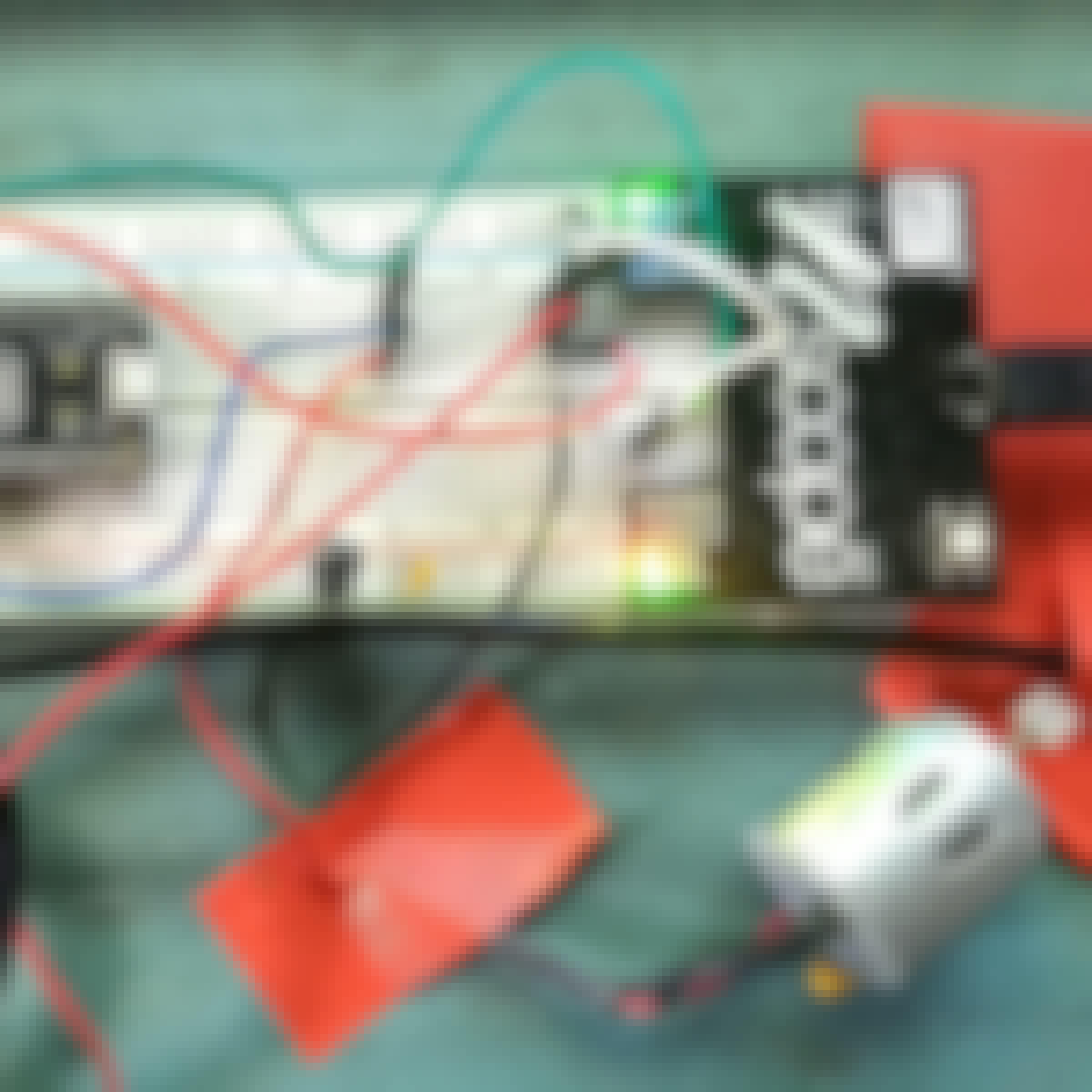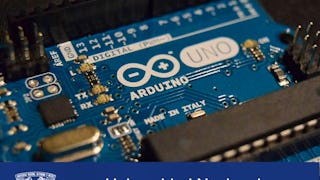- Browse
- Electronics
Electronics Courses
Electronics courses can help you learn circuit design, signal processing, microcontroller programming, and PCB layout. You can build skills in troubleshooting electronic systems, implementing embedded systems, and using simulation software to test designs. Many courses introduce tools like Arduino for prototyping, oscilloscopes for analyzing signals, and CAD software for designing circuit boards, all of that support creating functional electronic devices.
Popular Electronics Courses and Certifications
 Status: Free TrialFree TrialU
Status: Free TrialFree TrialUUniversity of Colorado Boulder
Skills you'll gain: Control Systems, Process Control, Manufacturing Processes, Automation Engineering, Embedded Software, Electronics, Semiconductors, Test Equipment, Medical Devices, Electronic Components, Performance Tuning, Reliability, Product Testing, Network Protocols
Build toward a degree
4.6·Rating, 4.6 out of 5 stars320 reviewsIntermediate · Course · 1 - 3 Months
 Status: PreviewPreviewU
Status: PreviewPreviewUUniversity of Pennsylvania
Skills you'll gain: Electric Power Systems, Electrical Systems, Safety Standards, Energy and Utilities, Electrical Safety, Environmental Regulations, Power Electronics, Sustainable Technologies, Hydraulics, Basic Electrical Systems, Thermal Management, Equipment Design, Semiconductors, Physics
4.7·Rating, 4.7 out of 5 stars660 reviewsBeginner · Course · 1 - 3 Months
 Status: Free TrialFree TrialU
Status: Free TrialFree TrialUUniversity of Colorado Boulder
Skills you'll gain: Electrical Power, Power Electronics, Electrical Systems, Torque (Physics), Electronic Components, Electric Power Systems, Electrical Equipment, Basic Electrical Systems, Semiconductors, Electrical Engineering, Mechanical Engineering, Mechanical Design, Electronic Systems, Engineering Calculations, Low Voltage, Electronics, High Voltage, Machine Controls, Energy and Utilities, Thermal Management
4.4·Rating, 4.4 out of 5 stars93 reviewsBeginner · Specialization · 1 - 3 Months
 Status: PreviewPreviewÉ
Status: PreviewPreviewÉÉcole Polytechnique Fédérale de Lausanne
Skills you'll gain: Materials science, Analytical Testing, Engineering, Scientific, and Technical Instruments, electromagnetics, Scientific Visualization, Laboratory Equipment, Electronics, Physics, Image Analysis, Mathematical Modeling
4.6·Rating, 4.6 out of 5 stars124 reviewsIntermediate · Course · 1 - 3 Months
 Status: FreeFreeU
Status: FreeFreeUUniversity of Minnesota
Skills you'll gain: Hydraulics, Mechanical Engineering, Schematic Diagrams, Simulation and Simulation Software, Power Electronics, Engineering, Model Based Systems Engineering, Simulations, Engineering Analysis, Control Systems, Automation Engineering, Engineering Calculations, Mechanics, Mathematical Modeling, Matlab
4.8·Rating, 4.8 out of 5 stars1.4K reviewsMixed · Course · 1 - 3 Months
 Status: PreviewPreviewU
Status: PreviewPreviewUUniversidad Nacional Autónoma de México
Skills you'll gain: Robotics, Automation, Control Systems, Prototyping, Programming Principles, Integrated Development Environments, Electronic Components, Embedded Systems, Electronics, Software Installation, Development Environment
4.6·Rating, 4.6 out of 5 stars630 reviewsMixed · Course · 1 - 4 Weeks
 Status: Free TrialFree TrialU
Status: Free TrialFree TrialUUniversidad Nacional Autónoma de México
Skills you'll gain: Music Theory, Music, Open Source Technology, Media Production, Musical Composition, Digital Signal Processing, Music History, Electronic Hardware, Post-Production, Electronics, Aesthetics, Hardware Design, Collaborative Software, Electronic Systems, Electronic Components, System Configuration, Data Sharing, Instrumental Music, Algorithms, Creativity
4.8·Rating, 4.8 out of 5 stars263 reviewsIntermediate · Specialization · 3 - 6 Months
 Status: Free TrialFree TrialJ
Status: Free TrialFree TrialJJohns Hopkins University
Skills you'll gain: Hardware Design, Electronic Hardware, Schematic Diagrams, Electronics, Computer-Aided Design, Mechanical Design, Communication Systems, Remote Access Systems, Wiring Diagram, 3D Modeling, Linux, Digital Communications, Serial Peripheral Interface, Electronic Components, Electrical Engineering, Web Applications, Internet Of Things, Systems Of Measurement, Digital Signal Processing, Data Processing
4.8·Rating, 4.8 out of 5 stars100 reviewsBeginner · Specialization · 3 - 6 Months
 Status: Free TrialFree Trial
Status: Free TrialFree TrialSkills you'll gain: Electrical Power, Electric Power Systems, Electrical Systems, Control Systems, Electrical Substation, Electrical Equipment, Energy and Utilities, Electrical Safety, Plant Operations and Management, High Voltage, Applied Mathematics, Power Electronics, Automation Engineering, Basic Electrical Systems, Electrical Engineering, Low Voltage, Process Control, Mathematical Modeling, Matlab, Three-Phase
4.5·Rating, 4.5 out of 5 stars264 reviewsIntermediate · Specialization · 3 - 6 Months
 Status: NewNewStatus: Free TrialFree Trial
Status: NewNewStatus: Free TrialFree TrialSkills you'll gain: Power Electronics, Thermal Management, Electrical Safety, Electrical Power, Building Codes, Electronic Systems, Electrical Systems, Electronic Components, Energy and Utilities, HVAC, Basic Electrical Systems, Electric Power Systems, Maintenance, Repair, and Facility Services, Safety Standards, Sustainable Technologies, Environmental Issue, Environment and Resource Management, Environmental Regulations, Environmental Engineering and Restoration, Geospatial Information and Technology
4.3·Rating, 4.3 out of 5 stars255 reviewsIntermediate · Specialization · 1 - 3 Months
 Status: PreviewPreviewT
Status: PreviewPreviewTTechnical University of Denmark (DTU)
Skills you'll gain: Power Electronics, Electrical Power, Plant Operations and Management, Electric Power Systems, Sustainable Technologies, Energy and Utilities, Semiconductors, Electronics, Electronics Engineering, Environmental Engineering, Electrical Engineering, Materials science, Physics, Engineering Calculations, Mathematical Modeling
4.6·Rating, 4.6 out of 5 stars161 reviewsIntermediate · Course · 1 - 3 Months
 Status: Free TrialFree TrialA
Status: Free TrialFree TrialAArizona State University
Skills you'll gain: Chemistry, Electrical Systems, Chemical Engineering, Energy and Utilities, Electronics, Materials science, Market Trend, Manufacturing Processes
4.6·Rating, 4.6 out of 5 stars26 reviewsBeginner · Course · 1 - 4 Weeks
In summary, here are 10 of our most popular electronics courses
- Sensor Manufacturing and Process Control: University of Colorado Boulder
- Exploring Renewable Energy Schemes: University of Pennsylvania
- Sensors for a Carbon Free World: University of Colorado Boulder
- Transmission electron microscopy for materials science: École Polytechnique Fédérale de Lausanne
- Fundamentals of Fluid Power: University of Minnesota
- Arduino y algunas aplicaciones: Universidad Nacional Autónoma de México
- Tecnología musical con software libre: Universidad Nacional Autónoma de México
- Raspberry Pi Projects: Johns Hopkins University
- Power System: Generation, Transmission and Protection: L&T EduTech
- Electric Vehicle Systems and Technologies: Coursera










